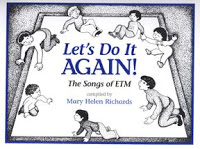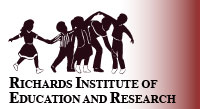Education Through Music is a course of study offered by the Richards Institute of Education and Research each school year throughout the country. (Disclaimer: No compensation or discount was received for this recommendation.)
I was first introduced to “ETM” by my very first co-teacher Meredith LeBlanc. I was a really green first year teacher and she pretty much told me that I HAD to go to ETM. I was very lucky because that year, we started school on a Wednesday and the first course was on that Friday, so I only had to teach 3 short days without ETM!
Since then I have completed 14 years of teaching, I’ve attended 13 Winter Courses and I’ve been to 6 Colloquiums (summer study). I’ve been blessed to participate in two year of private consultancy (very very challenging), and I’ve gotten to help teach in 2 day camps. So to say that my teaching has been informed by the work of ETM would be an understatement! I absolutely cannot imagine trying to teach children without ETM!
Expect to meet friendly people
You will meet lots of welcoming and friendly people! Be sure to wear comfortable shoes and clothes that you can easily move in because we will be singing and moving and playing games.
Expect to sing.
ETM was first intended as a way to develop music literacy, the primary approach that we use in ETM is singing, so we sing….a lot…. We hope that you will feel comfortable singing with us, even if you don’t know how or feel as if you can’t. Don’t worry about knowing the songs! You’ll learn them and you’ll have fun while you do! The auditory processing necessary to learn and remember the songs is one of the key skills that we are trying to develop in ourselves and our students, so our reliance on our ears and memory is intentional. It gets easier with practice!
Music teachers, please know that although this course is open to everyone, you don’t have to worry about it being over simplified. You will find plenty of robust musical challenges to meet your taste, we just feel that the work of ETM is important enough that we should share it with everyone. For those who wish there is masters credit available and since this is a music course, we spend time playing our way into what will eventually be complex part singing including ostinato, rounds canons, and choral octavos all using “hand” singing.
Expect to play!
We play song experience games together that are part of the repertoire for older children. We play these “big kid” games to build knowledge among the adults in the class of what real, constructive, intelligent play looks like. Real play is not passive, chaotic or rough, but intelligent and engaging. This distinction is an important one within the study of ETM because we believe and neurological studies would suggest that play is synonymous with intelligence.
Expect to focus on all forms of literacy.
We start with music literacy by providing playful practice at inner hearing. We play “secret song” games. We find rhythmic and melodic events in known songs. We use song mapping to develop self motivated symbols. We use “form books” to analysis and read known songs and major works. We use “tracks for reading” to offer children an opportunity to use a known song to support English language literacy. We use self motivated symbols and song maps to foster original compositions.
Expect to focus on language development.
 Songs are the foundation of everything we do in ETM. Each “ETM” song was chosen because of the way the words and the melody fit together. The melodies fit the prosody of the language. As a result, the song experiences of ETM are always a great choice for those teachers who want to support English language literacy or those working with English Language learners. The language of the song carries meaning! We work to ensure that especially students working in the early stages of ETM have the opportunity to do what they hear and sing and the same time.
Songs are the foundation of everything we do in ETM. Each “ETM” song was chosen because of the way the words and the melody fit together. The melodies fit the prosody of the language. As a result, the song experiences of ETM are always a great choice for those teachers who want to support English language literacy or those working with English Language learners. The language of the song carries meaning! We work to ensure that especially students working in the early stages of ETM have the opportunity to do what they hear and sing and the same time.
Expect to focus on young children.
Because of our understanding of neurology and child development, we spend a significant amount of time addressing the needs of babies, toddlers and preschoolers. We do this by equipping parents and caregivers with a variety of song experience games whose structures are designed to be a perfect for young children. There are times during class, after we have established what quality play looks that we suspend our “adultness” and take the time to experience and learn the song experience games for young children. When the schedule and opportunity allows, we do our best to provide a time to observe children during an “ETM” lesson. Sometimes this means that we arrange for children to attend the course during a given session, other times we make arrangements to have demonstrations take place at a school or daycare center. For those who would like to dedicate an extended time to observe children as they participate in song experience games I would recommend that you attend one of the summer Colloquiums.
Expect to focus on social and emotional development
Every ETM class offers the opportunity to examine the inevitable and practical realities of fostering the social and emotional needs of our children and students. We have found that in addition to offering an excellent means of developing musical literacy, the experiences found in ETM are often especially beneficial to the children we care for with the greatest needs.
During Winter course we have the opportunity to examine how our social and emotional development inform our availability to learning. We learn to recognize the stages of social and emotional development and how that should inform out teaching in our day to day practice.
Expect to focus on the brain and how it works.
The Richards Institute is dedicated to ensuring that all the work we do is well founded in neurological research. Part of each class is dedicated to how the brain works as it develops intelligence, memory and motivation. We will uncover ways to improve all 3! The neurological focus is one of several reasons why movement is such a huge element in any song experience game.
If this sounds like a lot to you, you are right! It is! This is why I have to keep going to back to study more. In my own experiences as a teacher at a school filled with students considered to be “at-risk”, ETM has offered me a life-line.
In classes that would have otherwise descended into chaos, these simple, tried and true, well established tightly structured song experience games have given me a way to reach children that would otherwise be inaccessible and unavailable to learning.
Because of the love my students have to these songs, it is clear to me that ETM teaching is the very best I can offer my students. Being a general music teacher at a public school, there are times that I have to teach other things in order to meet my curricular and performance demands, however, it is the song experiences of ETM that my students remember. It is the songs of ETM that keep my students motivated and learning. If you decide to attend a Winter Course, or Summer Colloquium please let me know! I’d love to introduce you to the wonderful folks of ETM!


I'd like to attend such course if its available in my country =) I'm sure I will benefit from it.
I know that there have been some courses in Japan, Canada and Australia. There is also the possibility of starting a new course if the demand is high enough. If I were you, I'd go ahead and email the Richards Institute and see if they can point you in the right direction.
Music always makes learning a bit more fun, hope theres still room!